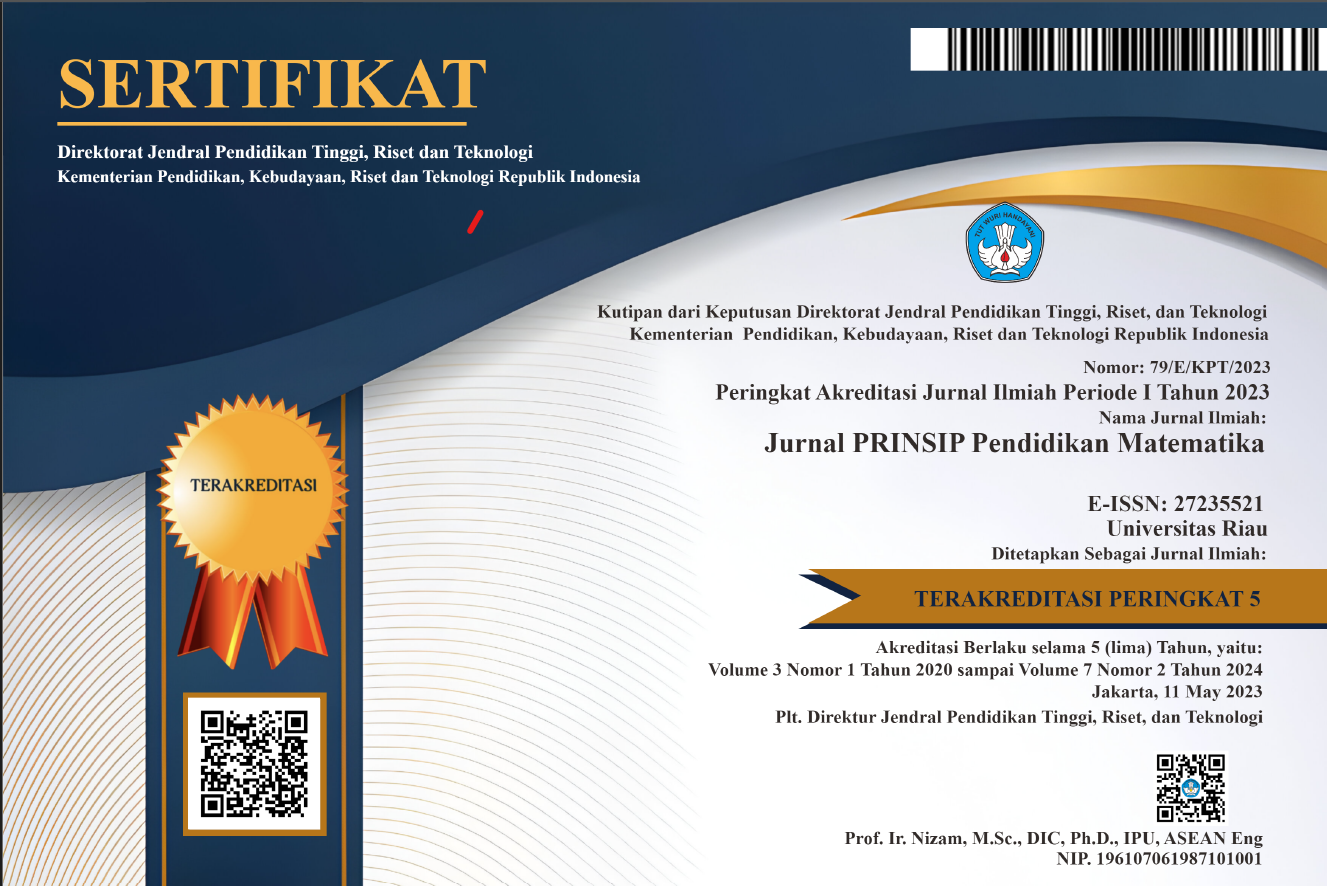METAKOGNISI DALAM PEMBELAJARAN MATEMATIKA
Abstract
Metacognition is the students’ ability in learning that includes about how learning should be done, so that it can determine what already known and not known yet. Metacognition has two components: metacognitive knowledge and metacognitive skills. Metacognitive knowledge relates to declarative knowledge, procedural knowledge, and conditional knowledge. Metacognitive skills relate to planning, monitoring, and evaluation towards the completion of a particular task. Metacognition has three stages: (1) planning about what, how, and when to learn it; (2) monitoring of learning process that being carried out; and (3) evaluating of what has been planned, done, and the results of that process. Metacognition of students in mathematics learning can be arisen at every stage of mathematical problem solving: understanding the problem, devising a plan, carrying out the plan, and looking back.
Downloads
References
Blakey dan Spence. (1990). Developing Metacognition. ERIC Digest. [Online] Tersedia:http://www.ericdigest.org/pre-9218/developing.htm. [19 Maret 2010]
Costay, A.L. (2001). “Mediating the Metacognitive”, dalam Developing Minds A Resource Book for Teaching Thinking. Alexandria, Virginia USA: ASCD.
Garofalo, J. & Lester, F. K. (1985). “Metacognition, Cognitive Monitoring, and Mathematical Performance”. Journal for Research in Mathematics Education. 16, 163-176.
Huitt, William G. (1997). Metacognition. [Online].Tersedia: http://tip.psychology.org/-meta.html. [17 Maret 2010]
Keiichi, S., Katsumi, Y., Hosoda, T. (1995). Metacognition in Mathematics Education. JASME, 1 ,55 – 63 .
Kuntjojo. (2009). Metakognisi dan Keberhasilan Peserta Didik. [Online]. Tersedia: http://ebekunt.wordpress.com/2009/04/12/metakognisi-dan-keberhasilan-belajar-peserta-didik/. [22 Mei 2010].
Lioe, L.T., Fai, H.K., Hedberg, J.G. (2006). Students’Metacognitive Problem Solving Strategies in Solving Open-ended Problems in Pairs. [Online]. Tersedia: http://conference.nie.edu.sg/paper/new converted/aboo 287.pdf. [10 Maret 2010].
Mangal, S.K., dan Mangal, S. (2019). Learning and Teaching. Delhi: PHI Learning Private Limited.
Matlin, M. W. (1998). Cognition. Philadelphia: Harcourt Brace College Publisher.
Misu, L. (2017). Studi Tentang Kesadaran Berpikir Metakognisi Mahasiswa Semester 1 Jurusan Pendidikan Matematika FKIP UHO. Jurnal Phenomenon, 7(2), 119 – 128
Nanang. (2012). Meningkatkan Kemampuan Siswa Dalam Pemecahan Masalah Matematik Melalui Pendekatan Metakognitif. Mosharafa, 1(1), 1 – 9
NCREL. (1995). Metacognition. [Online]. Tersedia: http://www.ncrel.org/sdrs/areas/-issues/students/learning/lrlmetn.html [23 Mei 2010]
Nur, M. (2000). Strategi-strategi Belajar. Surabaya: Pusat Studi Matematika dan IPA Sekolah
OLRC News. (2004). Metacognition. [Online]. Tersedia pada: http://www.literacy. kent.edu/ ohioeff/resource.doc. [27 Juni 2008].
Pativisan, S dan Niess, M.L. (2007). Mathematical Problem Solving Processes of Thai Gifted Students. Mediterranean Journal for Reasearch in Mathematics Education. Vol 6, (1 & 2), 46 – 68 .
Polya, G. (1973). How To Solve It. A New Aspect of Mathematical Method. (second ed). Princeton, New Jersey: Princeton University Press.
Prasetyoningrum, F.D., dan Mahmudi, A. (2017). Pengaruh Strategi Metakognitif Terhadap Kemampuan Pemecahan Masalah Matematis Siswa Kelas VIII di SMP Negeri 6 Yogyakarta. Jurnal Pendidikan Matematika, 6(4), 19 – 27
Sholihah, U. (2016). Membangun Metakognisi Siswa Dalam Memecahkan Masalah Matematika. Ta’allum, 4(1), 83 – 100
Sumardyono. (2004). Karakteristik Matematika dan Implikasinya Terhadap Pembelajaran Matematika. Paket Pembinaan Penataran. Depdiknas Dirjen Dikdasmen. Yogyakarta: P3G Matematika.
Suryadi, D. (2010). Teori, Paradigma, Prinsip dan Pendekatan Pembelajaran MIPA dalam Konteks Indonesia. Bandung: FPMIPA UPI.
Syaiful. (2011). Metakognisi Siswa Dalam Pembelajaran Matematika Realistik di Sekolah Menengah Pertama. Edumatica, 1(2), 1 – 13
Taccasu Project. (2008). Metacognition. [Online]. Tersedia: http://www.hku.hk/cepc/taccasu/ref/metacognition.html. [10 September 2008].
Tan, Oon-Seng. (2004). Enhancing Thinking through Problem-based Learning Approaches. Singapore: Thomson Learning.
Uno, H. B. (2007). Model Pembelajaran: Menciptakan Proses Belajar Mengajar yang Kreatif dan Efektif. Jakarta: Bumi Aksara.
Yimer, A dan Ellerton, N.F. (2006). Cognitive and Metacognitive Aspects of Mathematical Problem Solving: An Emerging Model. [Online]. Tersedia: http://www.merga.net.au/documents/RP672006.pdf. [18 Oktober 2009]
Yoong, W.K. (2002). Helping Your Students to Become Metacognitive in Mathematics: A Decade Later. [Online]. Tersedia: http://intranet.moe.edu.sg/maths/newsletter/fourthissue/vol2no5.html. [2 April 2010]





